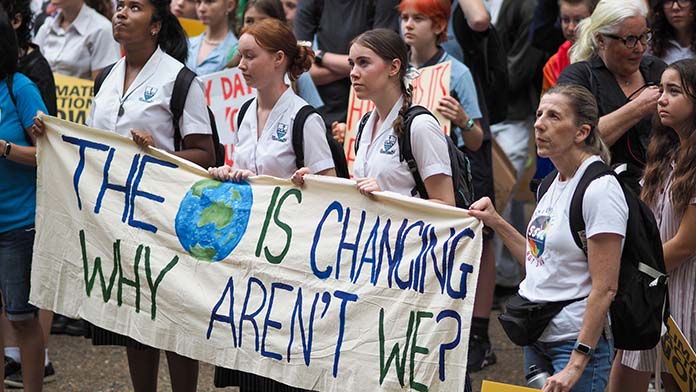The Greens and Labor have struck a deal to pass the climate Safeguard Mechanism bill.
While this may restrict the number of new coal and gas projects, the scheme won’t reduce actual emissions—and is a disaster for the climate.
The only substantial change is the introduction of a “hard cap” on absolute emissions produced by the facilities covered by the scheme.
This means that actual emissions won’t be allowed to increase above their current level.
The Greens backed down on their demand for a ban on new coal and gas. Instead the scheme allows new mining projects, but only if their emissions fall within the hard cap.
The scheme is supposed to reduce emissions from industrial and mining facilities by 28 per cent by 2030. But companies can still use offsets to meet their reduction targets. This means the scheme overall will do nothing to reduce emissions at all, with all the claimed reductions to come from offsets.
Any facility using more than 30 per cent offsets to meet its reduction targets will have to explain to the Clean Energy Regulator why. But this doesn’t stop them using unlimited offsets.
The Greens have hailed the deal as a big victory for the climate, saying it will stop half of the new planned coal and gas projects.
But the mining companies are not too concerned.
The Minerals Council’s Tania Constable said “we expect that [the changes] will have minimal impact on the mining industry overall.”
The Greens say that fracking in the Beetaloo basin in particular has been dealt a massive blow, since “all new gas fields for LNG export will need to be net zero CO2 from day one.”
But the Northern Territory government has already insisted that any fracking in the Beetaloo Basin must be net zero emissions.
Tamboran Resources, one of the main companies behind the development, said claims Beetaloo had been derailed were “100 per cent wrong” and welcomed the “certainty” the Safeguard Mechanism brought for their project.
There are also questions around how “hard” the cap is because it will be judged over a five year rolling average. This means emissions could rise above the cap in individual years. If they do rise above the cap there will simply be an onus on the Minister to consult and amend the Safeguard Mechanism Rules, or take other policy actions, to avoid this.
The climate change minister must also assess any new project’s impact on the hard cap before it’s approved.
But Chris Bowen says the Safeguard Mechanism already includes a “reserve” to allow new coal and gas projects to enter the scheme without blowing the overall emissions budget.
The scheme will put a pause on the use of new offsets generated by the controversial “Human Induced Regeneration” method until the process is tightened. But existing offsets using the method can still be sold.
Power not in parliament
The Greens won some concessions but have ended up supporting a scheme that will not deliver the climate action needed.
The week before, a new IPCC report warned “immediate and deep” cuts to emissions were needed to avoid catastrophe. UN Secretary-General Antonio Guterres said that developed countries like Australia needed to phase out coal completely by 2030 and stop approving new gas projects. Yet the Safeguard Mechanism allows fossil fuel expansion to continue.
“Negotiating with Labor is like negotiating with the political wing of the coal and gas corporations”, Adam Bandt said.
Labor is committed to running Australian capitalism—and this means supporting the immensely profitable sector coal and gas sector.
The Greens are kidding themselves to think that holding the balance of power in parliament can stop this.
Polling shows that 57 per cent of people are in favour of banning new fossil fuel projects. But awareness and criticism of Labor’s Safeguard Mechanism was only just starting to grow.
The Greens could have called mass meetings and protests to raise awareness about the problems with the scheme and increase pressure on Labor. A climate movement forum at Sydney Uni with the Australia Institute’s Richard Denniss and Adam Bandt at short notice drew 160 people.
Instead Labor was able to use the mainstream media to create pressure on The Greens not to block the scheme. Shamefully, a number of environment groups including the Australian Conservation Foundation lined up with this.
But the Greens’ electoralist outlook also limits their horizons on what is possible.
Their efforts to sell their deal as a win will only demobilise the climate movement, sending the message that parliament can take care of the problem.
We need a much bigger movement on the streets and in our workplaces to win a ban on new fossil fuels and force real emissions cuts.
By Jordi Pardoel






